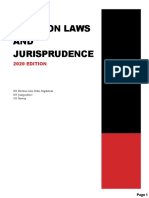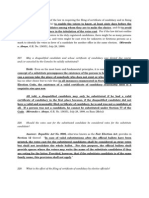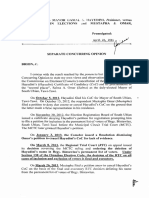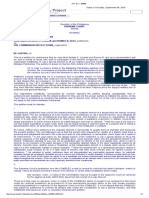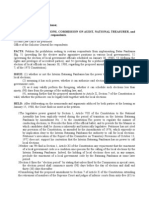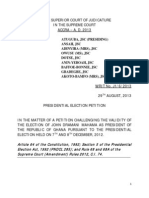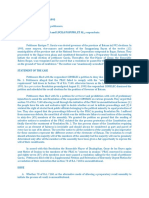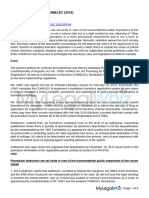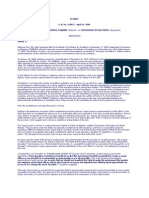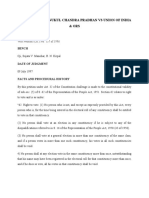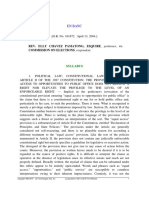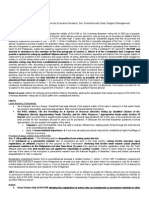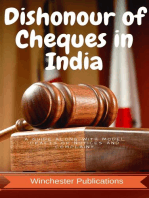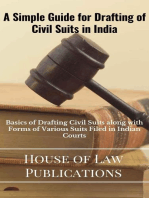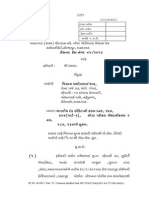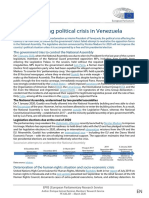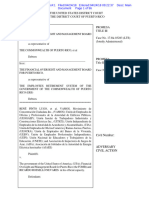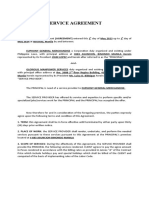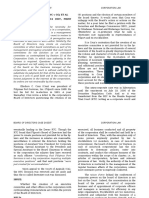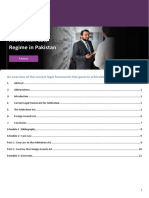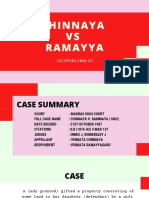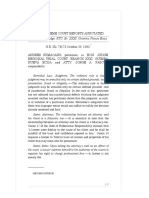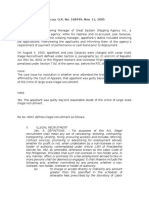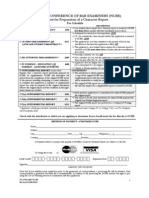Gujarat High Court Stays Compulsory Voting Rule in Gujarat Civic Polls (Read The Order!)
Gujarat High Court Stays Compulsory Voting Rule in Gujarat Civic Polls (Read The Order!)
Uploaded by
Manan BhattCopyright:
Available Formats
Gujarat High Court Stays Compulsory Voting Rule in Gujarat Civic Polls (Read The Order!)
Gujarat High Court Stays Compulsory Voting Rule in Gujarat Civic Polls (Read The Order!)
Uploaded by
Manan BhattOriginal Description:
Original Title
Copyright
Available Formats
Share this document
Did you find this document useful?
Is this content inappropriate?
Copyright:
Available Formats
Gujarat High Court Stays Compulsory Voting Rule in Gujarat Civic Polls (Read The Order!)
Gujarat High Court Stays Compulsory Voting Rule in Gujarat Civic Polls (Read The Order!)
Uploaded by
Manan BhattCopyright:
Available Formats
HC-NIC
C/SCA/13552/2015
ORDER
IN THE HIGH COURT OF GUJARAT AT AHMEDABAD
SPECIAL CIVIL APPLICATION NO. 13552 of 2015
==========================================================
KHEMCHAND RAJARAM KOSHTI....Petitioner(s)
Versus
STATE OF GUJARAT & 1....Respondent(s)
==========================================================
Appearance:
MR PS CHAMPANERI, ADVOCATE for the Petitioner(s) No. 1
ADVANCE COPY SERVED TO GP/PP for the Respondent(s) No. 1
==========================================================
CORAM: HONOURABLE THE ACTING CHIEF JUSTICE
MR.JAYANT PATEL
and
HONOURABLE MR.JUSTICE N.V.ANJARIA
Date : 21/08/2015
ORAL ORDER
(PER : HONOURABLE THE ACTING CHIEF JUSTICE
MR.JAYANT PATEL)
1.
We have heard Mr.Champaneri, learned counsel
for the petitioner.
2.
Section 79(d) of the Representation of the
People Act, 1951 (hereinafter referred to as R.P. Act)
reads as under.
(d) "electoral right" means the right of a person to
stand or not to stand as, or to withdraw or not to
withdraw from being, a candidate, or to vote or refrain
from voting at an election
3.
Member
The aforesaid shows that for the election of
of
Parliament
and
Member
of
Legislative
Page 1 of 9
Page 1 of 9
Created On Thu Aug 27 15:23:22 IST 2015
HC-NIC
C/SCA/13552/2015
ORDER
Assembly which is governed by the provisions of the
Representation of the People Act, electoral right of
the voters expressly provides for right to vote or to
refrain
from
expressly
voting
provided
at
the
in
election.
the
Such
statute
concept
negates
the
obligation in the nature of compulsion to be read upon
the voters to vote.
4.
the
As per the provisions of Part IX and IXA of
Constitution
Municipalities
further,
the
are
of
India,
given
elections
Panchayats
constitutional
of
the
status
Panchayats
as
and
and
per
Article 243-A and Article 243-ZA are to be conducted
by
the
State
Election
Commission.
As
per
the
provisions of the respective statutes, namely Gujarat
Panchayats Act, Gujarat Municipalities Act and Bombay
Provincial
Municipalities
Act,
voters
list
of
the
voters are to be the same as that of electoral roll of
the Legislative Assembly prepared and revised under
the provisions of the Representation of the People Act
for
the
time
being
in
force,
subject
to
the
modification under the Act. When the elections of the
Municipal Corporations, Municipalities and Panchayats
are to be conducted by the State Election Commission,
Page 2 of 9
Page 2 of 9
Created On Thu Aug 27 15:23:22 IST 2015
HC-NIC
C/SCA/13552/2015
ORDER
more particularly at par with the election of the
Member
of
Legislative
Assembly
and
Member
of
Parliament, it prima-facie appears that right to vote
should have the same meaning as so expressly provided
under
Section
79(d)
of
the
R.P.
Act
as
referred
hereinabove.
5.
It
is
true
that
Panchayats
and
Municipalities is a subject of the State in List II of
the Seventh Schedule of the Constitution of India, but
any statute made by the State Legislative has to meet
with
the
constitutional
provisions
and
more
particularly above-referred Part IX and IXA of the
Constitution of India. Apart from above, duty which is
otherwise not provided under the Representation of the
People Act upon the voters for the election of Member
of Parliament or election of Member of Legislative
Assembly,
elections
prima-facie
of
cannot
Municipal
be
imposed
Corporations,
in
the
Municipalities
and Panchayats.
6.
Right to vote is a statutory right conferred
upon any voter. By virtue of statutory provisions it
entitles voters to cast the vote. The moment such
provision is accepted as that of entitlement to cast
Page 3 of 9
Page 3 of 9
Created On Thu Aug 27 15:23:22 IST 2015
HC-NIC
C/SCA/13552/2015
ORDER
the vote, compulsion or obligation created to cast the
vote would negate the entitlement on right of any
voter. Once the name of any person is included in the
voters list, entitlement on right to cast the vote
would accrue but thereafter obligation or compulsion
cannot be read or provided upon the voter to cast the
vote. It is hardly required to be stated that when any
statute provides for a right to any citizen, such
citizen is bound to have freedom not to opt for such
right or exercise such right. Such freedom with any
voter is in-built in the provisions of Article 19(1)
(g) of the Constitution of India. The Representation
of People Act expressly recognises such right to vote
including the right to refrain from voting. But even
otherwise also, whenever any right is conferred upon
any person to do a particular act, it would always
include right to refrain therefrom.
7.
It further appears that the obligation so
created by way of compulsion is not a mere obligation,
but
it
further
therefore,
gravity.
the
The
provides
compulsion
moment
there
for
so
is
penal
imposed
more
consequences,
is
with
gravity
of
more
the
compulsion so created, it would further negate the
Page 4 of 9
Page 4 of 9
Created On Thu Aug 27 15:23:22 IST 2015
HC-NIC
C/SCA/13552/2015
ORDER
right to vote and right to refrain from voting.
8.
In
view
of
above,
it
prima-facie
appears
that obligation so created by Gujarat Act No.21 of
2014
bringing
Provincial
about
Municipal
the
amendment
Corporation
under
Act,
Bombay
Gujarat
Municipalities Act and Gujarat Panchayats Act may run
counter
to
the
basic
principles
of
entitlement
on
right of the voters to vote. At this stage, we may
profitably refer to the observations made by the Apex
Court in case of People's Union for Civil Liberties
Vs Union of India [2013(3) GLH 334 : (2013)10 SCC 1]
and more particularly paragraph 44 to 57.
45. Democracy and free elections are part of
the basic structure of the Constitution. In
Indira Nehru Gandhi v. Raj Narain, 1975 Supp 1
SCC 198 : (AIR 1975 SC 2299), Khanna, J., held
that democracy postulates that there should be
periodic elections where the people should be
in
a
position
to
re-elect
their
old
representatives or change the representatives
or elect in their place new representatives. It
was also held that democracy can function only
when elections are free and fair and the people
are free to vote for the candidates of their
choice. In the said case, Article 19 was not in
issue and the observations were in the context
of
basic
structure
of
the
Constitution.
Thereafter,
this
Court
reiterated
that
democracy is the basic structure of the
Constitution in Mohinder Singh Gill and Another
v. Chief Election Commissioner, New Delhi and
Others, (1978) 1 SCC 405 : (AIR 1978 SC 851)
and Kihoto Hollohon v. Zachillhu and Others,
Page 5 of 9
Page 5 of 9
Created On Thu Aug 27 15:23:22 IST 2015
HC-NIC
C/SCA/13552/2015
ORDER
1992 (Supp) 2 SCC 651 : (AIR 1993 SC 412).
46. In order to protect the right in terms of Section
79(d) and Rule 49-O, viz., "right not to vote", we are
of the view that this Court is competent/well within
its power to issue directions that secrecy of a voter
who decides not to cast his vote has to be protected in
the same manner as the Statute has protected the right
of a voter who decides to cast his vote in favour of a
candidate. This Court is also justified in giving such
directions in order to give effect to the right of
expression under Article 19(1)(a) and to avoid any
discrimination by directing the Election Commission to
provide NOTA button in the EVMs.
47. With regard to
ASG, by drawing our
Act, contended that
cast a vote and it
Section 62(1) of the
the above, Mr. Malhotra, learned
attention to Section 62 of the RP
this Section enables a person to
has no scope for negative voting.
RP Act reads as under:
"62. Right to vote.- (1) No person who is not, and
except as expressly provided by this Act, every
person who is, for the time being entered in the
electoral roll of any constituency shall be
entitled to vote in that constituency."
48. Mr. Malhotra, learned ASG has also pointed out that
elections are conducted to fill a seat by electing a
person by a positive voting in his favour and there is
no concept of negative voting under the RP Act.
According to him, the Act does not envisage that a
voter has any right to cast a negative vote if he does
not like any of the candidates. Referring to Section
2(d) of the RP Act, he asserted that election is only a
means of choice or election between various candidates
to fill a seat. Finally, he concluded that negative
voting (NOTA) has no legal consequence and there shall
be no motivation for the voters to travel to the
polling booth and reject all the candidates, which
would have the same effect of not going to the polling
station at all.
49. However, correspondingly, we should also appreciate
that the election is a mechanism, which ultimately
represents the will of the people. The essence of the
electoral system should be to ensure freedom of voters
to exercise their free choice. Article 19 guarantees
all individuals the right to speak, critisize, and
disagree on a particular issue. It stands on the spirit
of tolerance and allows people to have diverse views,
ideas and ideologies. Not allowing a person to cast
vote negatively defeats the very freedom of expression
and the right ensured in Article 21 i.e., the right to
liberty.
Page 6 of 9
Page 6 of 9
Created On Thu Aug 27 15:23:22 IST 2015
HC-NIC
C/SCA/13552/2015
ORDER
50. Eventually, voters' participation explains the
strength of the democracy. Lesser voter participation
is the rejection of commitment to democracy slowly but
definitely whereas larger participation is better for
the democracy. But, there is no yardstick to determine
what the correct and right voter participation is. If
introducing
a
NOTA
button
can
increase
the
participation of democracy then, in our cogent view,
nothing should stop the same. The voters' participation
in the election is indeed the participation in the
democracy itself. Non-participation causes frustration
and disinterest, which is not a healthy sign of a
growing democracy like India.
Conclusion:
51.
Democracy
being
the
basic
feature
of
our
constitutional set up, there can be no two opinions
that free and fair elections would alone guarantee the
growth of a healthy democracy in the country. The
'Fair' denotes equal opportunity to all people.
Universal adult suffrage conferred on the citizens of
India by the Constitution has made it possible for
these millions of individual voters to go to the polls
and thus participate in the governance of our country.
For democracy to survive, it is essential that the best
available
men
should
be
chosen
as
people's
representatives for proper governance of the country.
This can be best achieved through men of high moral and
ethical values, who win the elections on a positive
vote. Thus in a vibrant democracy, the voter must be
given an opportunity to choose none of the above (NOTA)
button, which will indeed compel the political parties
to nominate a sound candidate. This situation palpably
tells us the dire need of negative voting.
52. No doubt, the right to vote is a statutory right
but it is equally vital to recollect that this
statutory right is the essence of democracy. Without
this, democracy will fail to thrive. Therefore, even if
the right to vote is statutory, the significance
attached with the right is massive. Thus, it is
necessary to keep in mind these facets while deciding
the issue at hand.
53. Democracy is all about choice. This choice can be
better expressed by giving the voters an opportunity to
verbalize themselves unreservedly and by imposing least
restrictions on their ability to make such a choice. By
providing NOTA button in the EVMs, it will accelerate
the effective political participation in the present
state of democratic system and the voters in fact will
be empowered. We are of the considered view that in
bringing out this right to cast negative vote at a time
when electioneering is in full swing, it will foster
the purity of the electoral process and also fulfill
Page 7 of 9
Page 7 of 9
Created On Thu Aug 27 15:23:22 IST 2015
HC-NIC
C/SCA/13552/2015
ORDER
one of its objective, namely, wide participation of
people.
54. Free and fair election is a basic structure of the
Constitution and necessarily includes within its ambit
the right of an elector to cast his vote without fear
of
reprisal,
duress
or
coercion.
Protection
of
elector's identity and affording secrecy is therefore
integral to free and fair elections and an arbitrary
distinction between the voter who casts his vote and
the voter who does not cast his vote is violative of
Article 14. Thus, secrecy is required to be maintained
for both categories of persons.
55. Giving right to a voter not to vote for any
candidate while protecting his right of secrecy is
extremely important in a democracy. Such an option
gives the voter the right to express his disapproval
with the kind of candidates that are being put up by
the political parties. When the political parties will
realize that a large number of people are expressing
their disapproval with the candidates being put up by
them, gradually there will be a systemic change and the
political parties will be forced to accept the will of
the people and field candidates who are known for their
integrity.
56. The direction can also be supported by the fact
that in the existing system a dissatisfied voter
ordinarily does not turn up for voting which in turn
provides
a
chance
to
unscrupulous
elements
to
impersonate the dissatisfied voter and cast a vote, be
it a negative one. Furthermore, a provision of negative
voting would be in the interest of promoting democracy
as it would send clear signals to political parties and
their candidates as to what the electorate think about
them.
57. As mentioned above, the voting machines in the
Parliament have three buttons, namely, AYES, NOES, and
ABSTAIN. Therefore, it can be seen that an option has
been given to the members to press the ABSTAIN button.
Similarly, the NOTA button being sought for by the
petitioners is exactly similar to the ABSTAIN button
since by pressing the NOTA button the voter is in
effect saying that he is abstaining from voting since
he does not find any of the candidates to be worthy of
his vote.
9.
only
If interim order is not passed, it may not
create
complication
of
penal
action
at
all
ensuing elections, but validity of all such elections
Page 8 of 9
Page 8 of 9
Created On Thu Aug 27 15:23:22 IST 2015
HC-NIC
C/SCA/13552/2015
ORDER
may be questionable and vulnerable on the ground of
freedom
and
fairness
to
be
made
available
to
the
voters/citizens as guaranteed under the Constitution
of India.
10.
In view of above, following order is passed.
Rule, returnable on 24th September,
2015.
By way of interim order, there shall be interim relief
in terms of paragraph 9(B).
Notice to the Advocate General.
Direct service is permitted. Additionally,
the process shall also go through regular mode at the
cost of the petitioner.
(JAYANT PATEL, ACJ.)
(N.V.ANJARIA, J.)
Anup
Page 9 of 9
Page 9 of 9
Created On Thu Aug 27 15:23:22 IST 2015
You might also like
- Election Laws 2020 - PH ZEN EDITIONDocument186 pagesElection Laws 2020 - PH ZEN EDITIONTimNo ratings yet
- Tax Page4Document66 pagesTax Page4Anna Ayson-VegafriaNo ratings yet
- Lozada V Comelec G.R. No. L-59068Document3 pagesLozada V Comelec G.R. No. L-59068Teacher April CelestialNo ratings yet
- PetitionersspeechDocument8 pagesPetitionersspeechAnirudh AroraNo ratings yet
- Certificate of CandidacyDocument2 pagesCertificate of CandidacyJason Bas BalindongNo ratings yet
- Illustrative Case: Federation of Free Farmers vs. CA, GR 41161. September 10, 1981 - Intent Prevails The Text of The LawDocument6 pagesIllustrative Case: Federation of Free Farmers vs. CA, GR 41161. September 10, 1981 - Intent Prevails The Text of The LawAlrezaJanNo ratings yet
- Respondents.: Galvl-/L ') - HaDocument18 pagesRespondents.: Galvl-/L ') - HaJanine RegaladoNo ratings yet
- CASE LAW - RIGHT TO VOTE - PEOPLE'S UNION FOR CIVIL LIBERTIES & ANR. vs. UNION OF INDIA & ANR. - (2013) 12 S.C.R. 283Document41 pagesCASE LAW - RIGHT TO VOTE - PEOPLE'S UNION FOR CIVIL LIBERTIES & ANR. vs. UNION OF INDIA & ANR. - (2013) 12 S.C.R. 283mang tawmbingNo ratings yet
- I.20 Lozada Vs COMELEC GR No. L-59068 01271983 PDFDocument3 pagesI.20 Lozada Vs COMELEC GR No. L-59068 01271983 PDFbabyclaire17No ratings yet
- Peoples Union For Civil Liberties PUCL and Ors Vs s030229COM640521Document52 pagesPeoples Union For Civil Liberties PUCL and Ors Vs s030229COM640521Avni Kumar SrivastavaNo ratings yet
- OCCEÑA Vs COMELEC (1980) (GR No. L-52265)Document2 pagesOCCEÑA Vs COMELEC (1980) (GR No. L-52265)Michelle Jahnille Pablo100% (1)
- Gutierrez, Arnold Article 3 Section 11 To 13Document23 pagesGutierrez, Arnold Article 3 Section 11 To 13ARNOLD GUTIERREZNo ratings yet
- PDP-LABAN v. Commission On Elections, G.R. No. 225152 (2021) (J. Caguioa, Separate Concurring)Document9 pagesPDP-LABAN v. Commission On Elections, G.R. No. 225152 (2021) (J. Caguioa, Separate Concurring)Ferdie OquendoNo ratings yet
- Talaga v. ComelecDocument43 pagesTalaga v. ComelecG Ant MgdNo ratings yet
- Supreme Court Quarterly Digest - Constitution of India (Jan-Mar, 2024)Document17 pagesSupreme Court Quarterly Digest - Constitution of India (Jan-Mar, 2024)muhammed iqbalNo ratings yet
- Election Laws Premid Atty. GujildeDocument28 pagesElection Laws Premid Atty. GujildeCharm Tan-Calzado50% (2)
- Reviewer in Election Law - Sandoval NotesDocument21 pagesReviewer in Election Law - Sandoval NotesUi Bin DMNo ratings yet
- Lozada V ComelecDocument4 pagesLozada V ComelecRogie ToriagaNo ratings yet
- Durga Shankar CaseDocument3 pagesDurga Shankar CaseSakshara PrasadNo ratings yet
- Pamatong v. COMELEC, GR No. 161872, April 13, 2004Document5 pagesPamatong v. COMELEC, GR No. 161872, April 13, 2004Mctc Nabunturan Mawab-montevista100% (1)
- Judicial Department Cases (Consti 1)Document179 pagesJudicial Department Cases (Consti 1)Jezen Esther PatiNo ratings yet
- Lozada v. Commission On ElectionsDocument6 pagesLozada v. Commission On ElectionsJeremy MercaderNo ratings yet
- Election Laws - List of Additional CasesDocument10 pagesElection Laws - List of Additional CasesKenneth FabiaNo ratings yet
- Administrative Law, Law On Public Officers & Election Law: Bar Examination Questions and AnswersDocument34 pagesAdministrative Law, Law On Public Officers & Election Law: Bar Examination Questions and AnswersBer Sib JosNo ratings yet
- Supreme Court Final Verdict by Justice AtugubaDocument48 pagesSupreme Court Final Verdict by Justice Atugubapaa kwasi otchereNo ratings yet
- Velasco VS ComelecDocument11 pagesVelasco VS ComelecJoseph Dimalanta DajayNo ratings yet
- Supreme Court of India Page 1 of 11Document11 pagesSupreme Court of India Page 1 of 11Saransh BhardwajNo ratings yet
- Pamatong v. COMELECDocument2 pagesPamatong v. COMELECAlexa100% (4)
- Pradesh & Anr., The Court Held That The Principle of Equality BeforeDocument11 pagesPradesh & Anr., The Court Held That The Principle of Equality BeforeTanisha AgarwalNo ratings yet
- Election Petition JudgementDocument605 pagesElection Petition JudgementKofi Mc Sharp100% (1)
- Ghana Court CasioDocument588 pagesGhana Court CasiodmensahNo ratings yet
- G.R. No. 161872 April 13, 2004 Rev. Elly Chavez Pamatong, Esquire, Petitioner, COMMISSION ON ELECTIONS, RespondentDocument5 pagesG.R. No. 161872 April 13, 2004 Rev. Elly Chavez Pamatong, Esquire, Petitioner, COMMISSION ON ELECTIONS, RespondentcarlgerNo ratings yet
- Garcia Vs Comelec 1993 DigestDocument4 pagesGarcia Vs Comelec 1993 DigestJohn Soliven0% (1)
- Consti LegislativeDocument8 pagesConsti LegislativeJenica TaberneroNo ratings yet
- Prabhatam Advertisement PVT LTD Vs Municipal Corporation of Delhi South On 28 August 2015Document14 pagesPrabhatam Advertisement PVT LTD Vs Municipal Corporation of Delhi South On 28 August 2015Kritin BahugunaNo ratings yet
- That The Writ of Certeorari Can Be Issued Against The Order of Election CommisionDocument7 pagesThat The Writ of Certeorari Can Be Issued Against The Order of Election CommisionKinjal KeyaNo ratings yet
- Ramos Case-DigestDocument2 pagesRamos Case-DigestKervy Sanell Salazar100% (1)
- Q2.3 Daniel Da Costa JudgmentDocument13 pagesQ2.3 Daniel Da Costa Judgmentleonard98918No ratings yet
- Court of JusticeDocument3 pagesCourt of JusticesahilcusbNo ratings yet
- OCCEÑA Vs COMELECDocument3 pagesOCCEÑA Vs COMELECKristela AdraincemNo ratings yet
- Doctrines Finals JurisDocument3 pagesDoctrines Finals Jurisiaton77No ratings yet
- ConstiLaw1 Case DigestDocument10 pagesConstiLaw1 Case DigestSee Gee100% (1)
- Kabataan Party-List Vs COMELEC DECISIONDocument6 pagesKabataan Party-List Vs COMELEC DECISIONzacNo ratings yet
- The Commission On ElectionsDocument3 pagesThe Commission On ElectionsArnel MangilimanNo ratings yet
- CASE ANALYSIS OF SITA SOREN V NNNDocument3 pagesCASE ANALYSIS OF SITA SOREN V NNNrishupahuja90No ratings yet
- Pamatong Vs COMELECDocument4 pagesPamatong Vs COMELECmtabcaoNo ratings yet
- AASJS Vs DATUMANONGDocument58 pagesAASJS Vs DATUMANONGsan21cortezNo ratings yet
- Election Law List of CasesDocument101 pagesElection Law List of CasesRdn Diamante100% (3)
- 4.socrates Vs Comelec (Hagedorn)Document25 pages4.socrates Vs Comelec (Hagedorn)Kar EnNo ratings yet
- Case AnalysisDocument6 pagesCase AnalysisKanksha GuptaNo ratings yet
- Lozada V Comelec 120 SCRA 337Document5 pagesLozada V Comelec 120 SCRA 337john apostolNo ratings yet
- Thomas Mumba V The PeopleDocument6 pagesThomas Mumba V The Peoplechrvs murerwaNo ratings yet
- Election and CanvassDocument9 pagesElection and CanvassKristelle IgnacioNo ratings yet
- Pamatong v. COMELEC PDFDocument8 pagesPamatong v. COMELEC PDFliz kawiNo ratings yet
- 01 Macalintal v. COMELECDocument4 pages01 Macalintal v. COMELECvjcarinoNo ratings yet
- In Re Validity of Section 4 and Section 8Document19 pagesIn Re Validity of Section 4 and Section 8Jam NagamoraNo ratings yet
- Introduction to Negotiable Instruments: As per Indian LawsFrom EverandIntroduction to Negotiable Instruments: As per Indian LawsRating: 5 out of 5 stars5/5 (1)
- Act on Anti-Corruption and the Establishment and Operation of the Anti-Corruption: Civil Rights Commission of the Republic of KoreaFrom EverandAct on Anti-Corruption and the Establishment and Operation of the Anti-Corruption: Civil Rights Commission of the Republic of KoreaNo ratings yet
- Dishonour of Cheques in India: A Guide along with Model Drafts of Notices and ComplaintFrom EverandDishonour of Cheques in India: A Guide along with Model Drafts of Notices and ComplaintRating: 4 out of 5 stars4/5 (1)
- Simple Guide for Drafting of Civil Suits in IndiaFrom EverandSimple Guide for Drafting of Civil Suits in IndiaRating: 4.5 out of 5 stars4.5/5 (4)
- Supreme Court: Proof of Ownership Varies in Landlord - Tenant Litigation and Title Suit.Document19 pagesSupreme Court: Proof of Ownership Varies in Landlord - Tenant Litigation and Title Suit.Manan BhattNo ratings yet
- Gujarat High Court Ordered Probe in Custodial Death Case - Shwetang Patel Murder Case - Patidar Agitation - Police Atrocity - (Read The Order)Document9 pagesGujarat High Court Ordered Probe in Custodial Death Case - Shwetang Patel Murder Case - Patidar Agitation - Police Atrocity - (Read The Order)Manan BhattNo ratings yet
- SC Today: Limitation of Filling Written Statement Re Consumer Protection Act.Document16 pagesSC Today: Limitation of Filling Written Statement Re Consumer Protection Act.Manan Bhatt100% (4)
- Breach of Undertaking Attracts Contempt of Court (Read The Judgment)Document22 pagesBreach of Undertaking Attracts Contempt of Court (Read The Judgment)Manan BhattNo ratings yet
- SC: A Writ Court Should Ordinarily Not Entertain A Writ Petition, If There Is A Breach of Contract Involving Disputed Questions of Fact. (Principle Reiterated) Read The JudgmentDocument21 pagesSC: A Writ Court Should Ordinarily Not Entertain A Writ Petition, If There Is A Breach of Contract Involving Disputed Questions of Fact. (Principle Reiterated) Read The JudgmentManan BhattNo ratings yet
- Vismay Shah BMW Hit-And-Run Convict Gets Bail From Supreme Court of India (Read The Order!)Document2 pagesVismay Shah BMW Hit-And-Run Convict Gets Bail From Supreme Court of India (Read The Order!)Manan BhattNo ratings yet
- SC Slams Trial Judge For Passing An Order of Acquittal in Murder Trial As Witnesses Not Present Calls It A Mock Trial'Document19 pagesSC Slams Trial Judge For Passing An Order of Acquittal in Murder Trial As Witnesses Not Present Calls It A Mock Trial'Live Law100% (3)
- Vismay Shah (BMW Hit and Run Case, Ahmedabad) Judgment of Gujarat High Court of Rejection of Bail (For Suspension of Sentence)Document21 pagesVismay Shah (BMW Hit and Run Case, Ahmedabad) Judgment of Gujarat High Court of Rejection of Bail (For Suspension of Sentence)Manan BhattNo ratings yet
- A Note of Caution by Gujarat High Court To Minor Girls For Their ''Madness of Falling in Love". (Copy of Judgment)Document14 pagesA Note of Caution by Gujarat High Court To Minor Girls For Their ''Madness of Falling in Love". (Copy of Judgment)Manan BhattNo ratings yet
- Vismay Shah (Hit and Run Case) (BMW Hit and Run Case) Sessions Court Judgment (Gujarati)Document273 pagesVismay Shah (Hit and Run Case) (BMW Hit and Run Case) Sessions Court Judgment (Gujarati)Manan BhattNo ratings yet
- Karnataka Electricity (Taxation On Consumption) Act, 1959Document24 pagesKarnataka Electricity (Taxation On Consumption) Act, 1959Latest Laws TeamNo ratings yet
- Chairman Rand Paul's 2019 Festivus ReportDocument57 pagesChairman Rand Paul's 2019 Festivus ReportSenator Rand Paul90% (21)
- Continuing Political Crisis in VenezuelaDocument2 pagesContinuing Political Crisis in VenezuelaGergana PlachkovaNo ratings yet
- TL - Spouses Cruz Vs Sun Holidays, Inc., GR No. 186312, June 29, 2010Document7 pagesTL - Spouses Cruz Vs Sun Holidays, Inc., GR No. 186312, June 29, 2010KayeNo ratings yet
- White v. RoughtonDocument6 pagesWhite v. RoughtonEsther MozoNo ratings yet
- René Pinto Lugo, Et Al Vs Fomb Puerto RicoDocument96 pagesRené Pinto Lugo, Et Al Vs Fomb Puerto RicoJulio C. ColónNo ratings yet
- Civil Service Reforms 2004Document82 pagesCivil Service Reforms 2004Ruchi PatelNo ratings yet
- Berces V.guingonaDocument2 pagesBerces V.guingonazeyn100% (2)
- (Lecture) Void and Voidable MarriagesDocument5 pages(Lecture) Void and Voidable MarriagesZin WadNo ratings yet
- Agreement DraftDocument6 pagesAgreement DraftHR HaimeeNo ratings yet
- 10 Polish Rev Intl Eur L163Document7 pages10 Polish Rev Intl Eur L163Luigi MacababbadNo ratings yet
- Accize Si Taxe de Consumatie 2007-2015Document12 pagesAccize Si Taxe de Consumatie 2007-2015Adelina GînduNo ratings yet
- Biswaranjan Pattanayak Memorial Moot Court Competition. Winning Memorial.Document30 pagesBiswaranjan Pattanayak Memorial Moot Court Competition. Winning Memorial.Angswarupa Jen Chatterjee67% (3)
- Board of Directors Case DigestDocument16 pagesBoard of Directors Case DigestMa Gabriellen Quijada-TabuñagNo ratings yet
- Plaint and Written StatementDocument8 pagesPlaint and Written StatementAbhishek RaöNo ratings yet
- Motion For Reconsideration in Criminal CaseDocument3 pagesMotion For Reconsideration in Criminal CaseLeila Cruz100% (1)
- Insight Article A Study of The Arbitration Law in PakistanDocument12 pagesInsight Article A Study of The Arbitration Law in PakistanfayazNo ratings yet
- Bankrupsy LawDocument2 pagesBankrupsy LawboomtechNo ratings yet
- United States v. Campbell, C.A.A.F. (2002)Document16 pagesUnited States v. Campbell, C.A.A.F. (2002)Scribd Government DocsNo ratings yet
- Chinnaya Vs RamayyaDocument7 pagesChinnaya Vs Ramayyasanthosh MohankumarNo ratings yet
- 04 Sumaoang vs. JudgeDocument18 pages04 Sumaoang vs. JudgeJanine RegaladoNo ratings yet
- People Vs Capt GasacaoDocument3 pagesPeople Vs Capt Gasacaoejusdem generisNo ratings yet
- North Dakota Request For Character ExamDocument32 pagesNorth Dakota Request For Character ExamjohnrgalvinNo ratings yet
- COOL-Syllabus-2020.docx Version 1Document8 pagesCOOL-Syllabus-2020.docx Version 1Mark CastañedaNo ratings yet
- CBS News Battleground Tracker Poll: Florida, Nov. 6, 2016Document69 pagesCBS News Battleground Tracker Poll: Florida, Nov. 6, 2016CBS News PoliticsNo ratings yet
- 1.2 The UK Court SystemDocument15 pages1.2 The UK Court SystemLeon OosthuysenNo ratings yet
- ObliCon - 1275 To 1282Document4 pagesObliCon - 1275 To 1282LeaGabrielleAbbyFariolaNo ratings yet
- Focus Points Barlow Chapter 8: Ninth EditionDocument10 pagesFocus Points Barlow Chapter 8: Ninth EditionKaroline ThomasNo ratings yet
- Tumultuous AffrayDocument3 pagesTumultuous AffrayAlexPamintuanAbitanNo ratings yet
- People V PagalDocument4 pagesPeople V PagalDrew AnndieNo ratings yet
